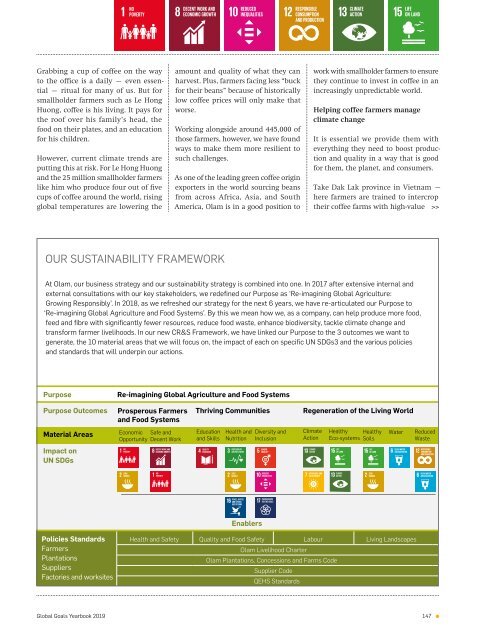Aliging Profit with Purpose - Global Goals Yearbook 2019
What are companies for? The rules for companies have changed. The focus is increasingly on their sustainable, social, and ecological impacts. The strategic orientation toward the so-called corporate purpose is decisive for profitable growth in the future. This currently results in a large number of questions for businesses: How do you find an inspiring and future-oriented corporate purpose, and how can it be aligned in such a way that it brings profitable growth and social responsibility in concert? The new 2019 edition of the Global Goals Yearbook offers answers to these crucial questions thanks to its consistent orientation toward the UN Sustainable Development Goals and a competent editorial board and author pool.
What are companies for? The rules for companies have changed. The focus is increasingly on their sustainable, social, and ecological impacts. The strategic orientation toward the so-called corporate purpose is decisive for profitable growth in the future.
This currently results in a large number of questions for businesses: How do you find an inspiring and future-oriented corporate purpose, and how can it be aligned in such a way that it brings profitable growth and social responsibility in concert? The new 2019 edition of the Global Goals Yearbook offers answers to these crucial questions thanks to its consistent orientation toward the UN Sustainable Development Goals and a competent editorial board and author pool.
You also want an ePaper? Increase the reach of your titles
YUMPU automatically turns print PDFs into web optimized ePapers that Google loves.
Grabbing a cup of coffee on the way<br />
to the office is a daily – even essential<br />
– ritual for many of us. But for<br />
smallholder farmers such as Le Hong<br />
Huong, coffee is his living. It pays for<br />
the roof over his family’s head, the<br />
food on their plates, and an education<br />
for his children.<br />
However, current climate trends are<br />
putting this at risk. For Le Hong Huong<br />
and the 25 million smallholder farmers<br />
like him who produce four out of five<br />
cups of coffee around the world, rising<br />
global temperatures are lowering the<br />
amount and quality of what they can<br />
harvest. Plus, farmers facing less “buck<br />
for their beans” because of historically<br />
low coffee prices will only make that<br />
worse.<br />
Working alongside around 445,000 of<br />
those farmers, however, we have found<br />
ways to make them more resilient to<br />
such challenges.<br />
As one of the leading green coffee origin<br />
exporters in the world sourcing beans<br />
from across Africa, Asia, and South<br />
America, Olam is in a good position to<br />
work <strong>with</strong> smallholder farmers to ensure<br />
they continue to invest in coffee in an<br />
increasingly unpredictable world.<br />
Helping coffee farmers manage<br />
climate change<br />
It is essential we provide them <strong>with</strong><br />
everything they need to boost production<br />
and quality in a way that is good<br />
for them, the planet, and consumers.<br />
Take Dak Lak province in Vietnam –<br />
here farmers are trained to intercrop<br />
their coffee farms <strong>with</strong> high-value >><br />
OUR SUSTAINABILITY FRAMEWORK<br />
At Olam, our business strategy and our sustainability strategy is combined into one. In 2017 after extensive internal and<br />
external consultations <strong>with</strong> our key stakeholders, we redefined our <strong>Purpose</strong> as ‘Re-imagining <strong>Global</strong> Agriculture:<br />
Growing Responsibly’. In 2018, as we refreshed our strategy for the next 6 years, we have re-articulated our <strong>Purpose</strong> to<br />
‘Re-imagining <strong>Global</strong> Agriculture and Food Systems’. By this we mean how we, as a company, can help produce more food,<br />
feed and fibre <strong>with</strong> significantly fewer resources, reduce food waste, enhance biodiversity, tackle climate change and<br />
transform farmer livelihoods. In our new CR&S Framework, we have linked our <strong>Purpose</strong> to the 3 outcomes we want to<br />
generate, the 10 material areas that we will focus on, the impact of each on specific UN SDGs3 and the various policies<br />
and standards that will underpin our actions.<br />
<strong>Purpose</strong><br />
Re-imagining <strong>Global</strong> Agriculture and Food Systems<br />
<strong>Purpose</strong> Outcomes Prosperous Farmers Thriving Communities Regeneration of the Living World<br />
and Food Systems<br />
Material Areas<br />
Impact on<br />
UN SDGs<br />
Economic Safe and<br />
Opportunity Decent Work<br />
Education<br />
and Skills<br />
Health and<br />
Nutrition<br />
Diversity and<br />
Inclusion<br />
Climate<br />
Action<br />
Healthy Healthy<br />
Eco-systems Soils<br />
Water<br />
Reduced<br />
Waste<br />
Enablers<br />
Policies Standards<br />
Farmers<br />
Plantations<br />
Suppliers<br />
Factories and worksites<br />
Health and Safety Quality and Food Safety Labour Living Landscapes<br />
Olam Livelihood Charter<br />
Olam Plantations, Concessions and Farms Code<br />
Supplier Code<br />
QEHS Standards<br />
<strong>Global</strong> <strong>Goals</strong> <strong>Yearbook</strong> <strong>2019</strong> 147

















